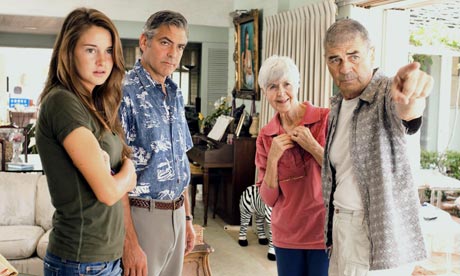 Matt King (George Clooney) is a lawyer living in Hawaii, a
descendant of the Aloha State’s
royal bloodline stemming from the union
in the 1840s between a missionary's businessman son and a native Polynesian
princess. In fact, Matt is the sole executor
of the family trust which owns a vast plot of land worth billions of dollars.
All the family members, various cousins scattered over the islands, have agreed
to cash in and now just need Matt to play his role and negotiate the sale. There
is some urgency, since in seven years a change in legislation means that the
sale will no longer be possible.
Matt King (George Clooney) is a lawyer living in Hawaii, a
descendant of the Aloha State’s
royal bloodline stemming from the union
in the 1840s between a missionary's businessman son and a native Polynesian
princess. In fact, Matt is the sole executor
of the family trust which owns a vast plot of land worth billions of dollars.
All the family members, various cousins scattered over the islands, have agreed
to cash in and now just need Matt to play his role and negotiate the sale. There
is some urgency, since in seven years a change in legislation means that the
sale will no longer be possible.Saturday 3 March 2012
The Descendant must decide
 Matt King (George Clooney) is a lawyer living in Hawaii, a
descendant of the Aloha State’s
royal bloodline stemming from the union
in the 1840s between a missionary's businessman son and a native Polynesian
princess. In fact, Matt is the sole executor
of the family trust which owns a vast plot of land worth billions of dollars.
All the family members, various cousins scattered over the islands, have agreed
to cash in and now just need Matt to play his role and negotiate the sale. There
is some urgency, since in seven years a change in legislation means that the
sale will no longer be possible.
Matt King (George Clooney) is a lawyer living in Hawaii, a
descendant of the Aloha State’s
royal bloodline stemming from the union
in the 1840s between a missionary's businessman son and a native Polynesian
princess. In fact, Matt is the sole executor
of the family trust which owns a vast plot of land worth billions of dollars.
All the family members, various cousins scattered over the islands, have agreed
to cash in and now just need Matt to play his role and negotiate the sale. There
is some urgency, since in seven years a change in legislation means that the
sale will no longer be possible.Saturday 14 January 2012
The Artist - a must see
 In the late nineteen-twenties a newspaper
publishes a picture of heart-throb silent screen star George Valentin (Jean
Dujardin) being kissed by Peppy Miller (Bérénice Bejo). The young aspiring
Peppy has yet to embark on her career in the new "talkies" but in a
touching subsequent encounter in George's dressing room, he gives her a gift.
It is the idea of how to make herself memorable and stand out from the
other actresses: quite simply, that she should always wear a beauty spot. This is a
love story, powered by the ambition and gratitude of Peppy, overcoming the
pride George.
In the late nineteen-twenties a newspaper
publishes a picture of heart-throb silent screen star George Valentin (Jean
Dujardin) being kissed by Peppy Miller (Bérénice Bejo). The young aspiring
Peppy has yet to embark on her career in the new "talkies" but in a
touching subsequent encounter in George's dressing room, he gives her a gift.
It is the idea of how to make herself memorable and stand out from the
other actresses: quite simply, that she should always wear a beauty spot. This is a
love story, powered by the ambition and gratitude of Peppy, overcoming the
pride George.Monday 5 December 2011
Kodak - don't you love them
Dinesh Raghuram: Welcome to Kodak, my name is Dinesh Raghuram. Please wait while I review your question.Trevor Smith: OKDinesh Raghuram:
Sunday 18 September 2011
Planning Law Changes Set to Ruin Countryside

Sunday 28 August 2011
Best Steak Frites in London
Tuesday 23 August 2011
In a Better World
Sunday 21 August 2011
Black Lion in Long Melford - Special Recommendation
Friday 10 December 2010
Monsters – the War on Terror Re-analysed

Technically, Gareth Edwards movie "Monsters" breaks new ground in production methods and animation. It was shot on a shoestring budget in Guatemala and Mexico, with a professional actor cast of just two (Whitney Able and Scoot McNairy) using improvised dialog and extras hired in at each location. With Adobe Creative Suite to edit the film shot on a Sony EX3, Edward's visual effects engineer background allowed him personally to deliver all the "Monster" animation with five months of work; with 250 effects shots that is a phenomenal rate of 2 per day. The monsters were created with a software package called "3ds Max": "It was the hardest challenge of the whole film because I had never done proper creature animation before," says Edwards.
Edwards also wrote the script and this is what sets him apart from so much of the SF genre. Much of the film is an emotional journey between the principle characters, Kaulder, a news photographer and Able, who he is ordered to escort safely back home to the USA by her father who is also his boss. Various convincing mishaps result in their needing to cross the "infected zone," a route used only by the desperate. On another level, this is a movie about how real people might actually cope with an alien invasion. In northern Mexico, the locals have accepted life coexisting with the aliens: they are only dangerous when the US air force is delivering their chemical warfare over the infected zone. From the US perspective, the approach is containment and then destruction: a massive wall to defend the US border and then chemical attack.
 Parallels with the war on terror and indeed the general approach of the Western world to any perceived threat, are disturbingly evident. When we encounter the aliens close up, however, we witness behaviour you might reasonably expect from humans. Yes they will destroy you if you shoot at them, but we also see inquisitiveness (tentacles touching a TV screen to try to understand it) and an encounter between two of the aliens that is evidence of a bond between them, maybe even love. Perhaps these aliens would be no threat to us if we only tried to understand them and treated them reasonably!
Parallels with the war on terror and indeed the general approach of the Western world to any perceived threat, are disturbingly evident. When we encounter the aliens close up, however, we witness behaviour you might reasonably expect from humans. Yes they will destroy you if you shoot at them, but we also see inquisitiveness (tentacles touching a TV screen to try to understand it) and an encounter between two of the aliens that is evidence of a bond between them, maybe even love. Perhaps these aliens would be no threat to us if we only tried to understand them and treated them reasonably!
Friday 14 May 2010
I'm afraid I did
Thursday 29 April 2010
Gillian Duffy
"But there's too many people now who aren't vulnerable but they can claim and people who are vulnerable can't claim, can't get it.....You can't say anything about the immigrants because you're saying that you are ... But all these Eastern Europeans what are've comin in, where are they flocking from... And what are you going to do about students that are coming in now...."
Is this bigoted? Or to put it another way, do you think she would be a suitable recruit into our immigration department?




